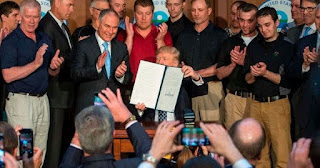A few days ago, on the warmest day yet this spring, outdoor café’s and bars in Gothenburg were filled with people enjoying the weather. It was a sunny day, almost 20°C in early April so I choose to take a long walk in the nature reserve adjacent to the Botanical garden. Sitting on a hill, only a few km from the city centre, the traffic noise of the city was reduced to a slow humming in the background, almost drowned out by the sound of blackbirds singing in the treetops.
In a moment like this, looking at the sun setting over the water in the distance, everything looked almost normal. The distant flash from the Vinga lighthouse becoming visible as dusk was setting; the spring sky still too light for any stars to show.
Yet we know…
- 3 million years are slowly catching up with us.
- 3 million years of change that we have compressed into 2 centuries since the start of the industrial revolution.
- 3 million years of change that were hidden in the deep sea and the slowly melting glaciers.
- 3 million years of change that will transform the world as we know it.
This brutal message can be found in several recent studies. 3 million years, that’s how far back we need to go to find a time when carbon dioxide levels were as high as they are today. If we could send a scout back in time, he or she would find a world very different from ours, with sea levels 15-20 meters higher than today and trees growing on what are now the ice covered plateaus of Antarctica. Globally, temperatures were 3-4°C higher than today, but in Antarctica, temperatures were 20°C higher, changing it from glacier to tundra. And since that time, the global temperatures have not exceeded 1.5°C over the preindustrial baseline, a level now considered a warning threshold.
Surely on the return to our time, our time traveller would waste no time to speak before governments and the world, telling us that our coastal cities are about to become the modern versions of Atlantis and a new era of massive migration is upon us. The message would be clear, change path and prepare for a different future or succumb to the climate disruption that we have started.
But alas, this tale of the imagined time traveller has already been told to us again and again by the scientists that have spent their lives investigating our climate system. For each passing year, their warnings have been more and more stern, their call upon us to act more urgent. So even a truth speaking time traveller might not be enough break through our obsession with “growth and progress”.
Still, maybe this winter we have seen the arrival of a storyteller persistent enough to break through media wall. But rather than storyteller I would call Greta Thunberg a catalyst that for a movement that might become strong enough to shake us enough to make us understand that change is coming, wether we like it or not. The tool used by Greta and her fellow activists (and there are many around the world) has been to strike from school, using the hard to refute argument “why study for a future that will be denied us?”. What is really amazing and a potential game changer is that Greta has inspired so many other young girls between 13 and 18 years. This is a group that has been looked down upon, almost ridiculed as Generation Z. Instead they have shown to be smart, knowledgable and well organised, making global connections and inspiring each other.
These kids have like the child in HC Andersens tale about the naked emperor unmasked the various attitudes so many of our political “leaders”; slow or faked engagement, hidden indifference or even climate science denial. Many of the remaining climate deniers or climate delayers are also fiercely opposed to other aspects of a just society, like women’s and LBTQ rights as well as immigration. That the same persons refuse the action on climate change that will lead to the very migration waves they are so scared of is parodic, had it not been so tragic.
It is unlikely that the young and vocal girls now leading the climate movement will accept to step back and let “older and wiser men” take command again. But to the people in power they are a threat, one reason being that they are not yet entangled in the normality of mortgages and consumption that has subdued so many of us. So we, who call ourselves grownups, need to shake us loose and stand behind and support these young activists. Each and everyone of us should do all that we can in our own lives to live a low carbon life, there is no conflict between personal change and activism. But as I have written before, the valiant quest is not a simple journey. So we need to understand, accept and embrace this task, because it is what we need to do save our humanity.













